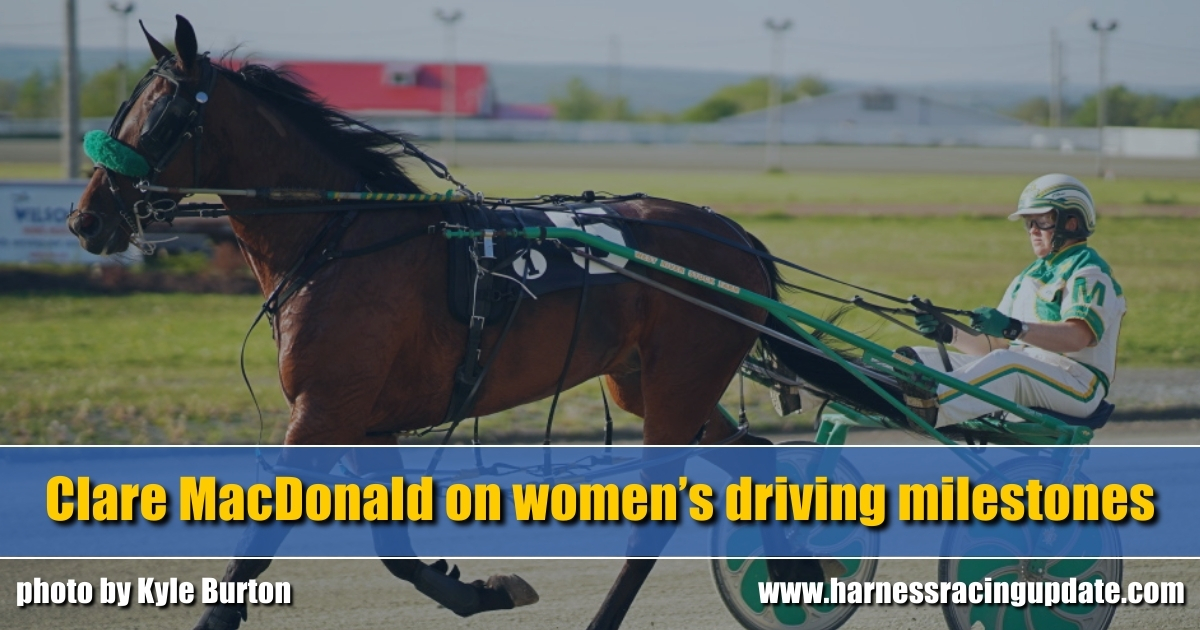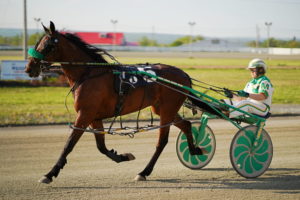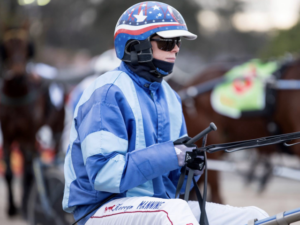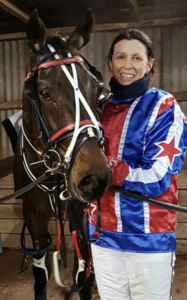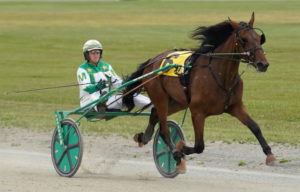Clare MacDonald on women’s driving milestones
North America’s leading, active, female driver nears 1,500 wins, reflects on the 4,000th career victory by Australia’s Kerryn Manning and ponders why there aren’t more women drivers.
by Melissa Keith
On Jan. 25, Australian driver Kerryn Manning guided pacer Glenavril King to victory at the Stawell Harness Racing Club, her home track. The win marked the first time a female driver or jockey had reached 4,000 career wins, anywhere. Now 44, Manning has been driving for nearly three decades on a continent where female drivers are statistically better represented than in North America. Women are not uncommon on each year’s top ten list of Australian drivers: Manning first made the list in 1999, and was number one by total wins in a remarkable reign from 2001 through 2005, inclusive. Over the past decade, Aussie reinswomen Danielle Hill, Kate Gath, Amanda Turnbull, and Lauren Tritton have all made the annual list of winningest drivers at least once.
In contrast, there are just three female North American drivers with more than 1,000 lifetime wins: Bea Farber, who passed away last year, still holds the record of 1,801. Jacqueline Ingrassia, now 73 years old, has 1,164 victories. The lone woman listed among the USTA’s top drivers by UDRS (10-299 starts) is Nova Scotia’s Clare MacDonald. In 2020, her .313 UDRS was achieved over a selective, stakes-heavy season, with 28 wins from 141 starts. She ended the year just two wins away from reaching the 1,500 mark.
In 2007, MacDonald hit 1,000 career driving wins with homebred trotter West River Redwing at Summerside Raceway.
“It’s so common for a driver to make 1,000 wins if you’re a man and you’re driving a lot,” she told HRU. “For the amount of women, and the number they drive, in comparison, it’s quite an accomplishment.”
No Canadian woman had previously reached the milestone, which put MacDonald third behind Farber and Ingrassia among this continent’s female drivers at the time. She has since surpassed Ingrassia’s record.
The pursuit of win 1,500 wasn’t enough to convince MacDonald to pick up catch drives at Red Shores Charlottetown, the only Canadian track currently racing. Two days after the country celebrated National Women and Girls in Sport Day on Wednesday (Feb. 3), MacDonald was busy training a handful of 2-year-olds at her West River Stock Farm, in Antigonish, NS. The multi-talented horsewoman added that four mares are expecting foals at the farm this season, keeping the familiar “West River” name alive. Three years ago, through sheer bad luck, “It was the first time in 50-some years that we didn’t have a foal born on the farm.”
DESTINED TO DRIVE
Mary Clare MacDonald, née Haley, was destined to drive. Joe O’Brien was known to introduce her father to high-profile Americans in unequivocal terms: “This is Ed Haley from Nova Scotia, the finest driver of pacers in North America.” Haley founded the West River Stock Farm and raced horses out of his Antigonish, NS base, plus stables at Sackville Downs and Truro Raceway. “I was treated with respect because of who I was,” said daughter Clare, who would casually ride the farm’s breeding stallions when she was a child. “I was always tagging along at all the tracks, so I knew everybody and they knew me. I’d been warming up horses since I was probably 11 or 12, race days, on the track; doing a lot of training at home. […] They knew that as soon as I could get my license, that’s what I was inspired to do.”
While women were allowed to drive, her youth posed a problem. “It’s funny because back then, the age limit through the USTA was 18,” she recalled. (At the time, the Maritime provinces were District 10 of the USTA). Fortunately, her USTA representative advocated on her behalf. “In October, when they had their meeting, Frankie Daniels came back from the meeting in Columbus,” said MacDonald. “He was in the [Truro Raceway] paddock and he came over to see dad and I. He said, ‘I’ve got awful good news for you. We had a discussion and we decided to try for a year, backing up the age limit to 16. I said, I know this little girl who’s going to be 16 in a few months. You’re going to get in from the ground floor.’”
She didn’t hesitate, and nor did her future husband. “I turned 16 in December 1977, and I wrote my test a couple of days after that. I was driving by March. Kenny [MacDonald] wrote his test around the same time, we did our qualifying drives at the same time, and got our licenses at the same time. We weren’t married yet, but we were going together.”
Her first drive was in 1978 at Sackville Downs, behind family-owned West River Norman. “He was a little free-legged horse who liked to front run,” recalled MacDonald. “I sent him off the front and made a green rookie mistake, and invented the passing lane at the same time, because I drifted off the rail and Edgar ‘Sparky’ Clarke came up the inside and won.” A week later, she drove Dellmors Chief to her first career victory. “And I won my next one with the same horse. He was owned by a family friend, Archie Chisholm, and trained here on this track [in Antigonish, NS] all the time.”
Thanks to her family connection, getting drives wasn’t a problem, even for a girl. “Dad had quite a few horses racing at the time,” she explained. “I would get a few catch drives, from close friends and stuff, but they were pretty well all what he had. He had open heart surgery so he wasn’t driving, so I basically had the whole stable to drive.” The USTA record shows she had 218 drives in her first year of pari-mutuel competition; the number drops to 42 drives in 1979, when she married and became pregnant with her first child. She returned to the sulky with 148 listed drives in 1980, a turning point in her life and career: “It would have been around ‘80-’81 when I took over [West River Stock Farm]. There were 54 active sets of [horse registration] papers in the house.”
Ed Haley passed away in 1990. Clare and husband Ken scaled back West River Farm, focusing on developing Maritime stakes prospects. “In sad’s day, there were often 12-14 foals a year born, but we never strove for that when we took over,” she said. “Two or three would be sufficient, and I was basing it more on quality than quantity, plus the fact that to stay economically viable, I had to leave room for boarders.”
MacDonald stands out because few North American women have followed a similar path, and none with her success as a catch driver. “I guess I’m one of the few that’s doing it as a living,” she said. “A lot of them are driving as a hobby, and only have a few drives a year. I don’t have near the numbers that I used to have, but still…. If you look, I’ve stayed ultra-consistent for 40 years; my driving average hovers around the .300 mark.”
While she always wanted to be a professional driver, MacDonald suggested that the untimely death of her older brother made it less of a choice, more of a destiny. In 1969, Rinaldo “Neldie” Haley was killed outside Antigonish in a car accident. “He was leading driver at Truro Raceway and he was only 22, but he’d been leading driver there the last two years, and was leading at the time of his death,” she explained. “That was a life-changing experience for the whole family, because there was no doubt: This was his to be had.” Neldie’s inheritance would have been West River Farm, as well as at least some of the drives upon which his younger sister would build her career.
How good was Neldie Haley? MacDonald said to ask Billy O’Donnell or Marcel Barrieau: “They were all of the same vintage, and they’d gone to Montreal together and worked for Marcel’s brother, Rufin. Neldie was the top driver. The others were just following in his footsteps.” As did Clare, who was only 7 at the time of her brother’s passing. “Oh, I just idolized him, like anybody would. Going to the races, he had pretty much taken over, because dad wasn’t driving much in those years.”
MacDonald’s own skill is undeniable. She guided homebred West River Exotic (4, 1:55.2m; $377,296 U.S.) to the Maritime provinces’ first sub-2:00 trotting mile in 1994; the 1:59.4h mark still stands as the track trotting record at Exhibition Park Raceway. Until recently, the gelding was the fastest and richest Maritime-bred of his gait. On the pacing side, “West River Diesel [p, 5, 1:56h; $90,071 U.S.] will always have a special place in our hearts,” said the woman who raised and raced him. “He just was a great racehorse for us. Unfortunately, he developed EPM, but he was one of our better stakes colts who went on to be an Invitational horse.”
When a female driver takes to the track in Canada or the United States, the horse is usually one that she owns or trains. This hasn’t been the case for MacDonald, who is also in demand as a catch driver. While the Maritimes have an abundance of driving talent, it remains overwhelmingly male. MacDonald made history when she drove Kilkerrran Ingle (p, 5, 1:54.4h; $125,787 US) as an older horse, winning a 1993 Gold Cup and Saucer Trial and finishing third in the final, as well as capturing Truro Raceway’s 1993 Exhibition Cup in a lifetime best and track record. Kilkerran Ingle became the first-ever Maritime-bred pacer to win in a sub-1:55 clocking over a Maritime track.
More recently, MacDonald has catch-driven the undefeated gelding who rewrote every divisional record in the Maritimes last season, Woodmere Stealdeal. “He’s phenomenal,” she said. “He’s just got an engine you dream about. He’d rank right up there, because he was doing things at 2 that normally the majority of the horses I’ve driven would be doing at three or as aged horses, if they were good enough. Some of his races, he was going as fast as the top class on the card.”
MacDonald’s sense of daring remains intact, even after two serious accidents in 2008. Early that season, she was kicked in the face by Super S Crosby, a green trotter who was startled by noise at Inverness Raceway. “He wasn’t the brightest horse in the world, but he certainly wasn’t a mean horse. It was totally a freak accident,” said the driver who went to Halifax by ambulance that day, had surgery for fractured bones in her face, then returned to the sulky for Super S Crosby’s maiden-breaking Atlantic Sires Stake win in August. Not long after, she and filly Larshegoes went down at Exhibition Park Raceway after hitting another filly who had fallen to the track. MacDonald was knocked unconscious and suffered a concussion, but no lasting injuries. “If I was involved in a car accident, would I stop driving forever?” she quipped. “It’s my way of life. If I was scared I was going to get hurt, I probably never would have done it in the first place.”
It’s tough to imagine a North American woman in the running for Dan Patch or O’Brien Driver of the Year, but Kerryn Manning has accomplished the equivalent Down Under, perhaps motivating other girls and women to try their hand at driving. It’s hard to quantify her effect as a role model, but there is a definite presence of competitive female drivers there that is not mirrored in North America.
“It would be nice to see more women driving, but I think possibly a lot of them prefer to do the care and management, and not take the risk of being on the track,” said MacDonald, citing the prevalence of female trainers and caretakers. “Maybe they have families; maybe they aren’t as supported as I was. Kenny was extremely supportive of the fact that I wanted to drive and I was going to drive. I couldn’t have done it without him.” Not coincidentally, Manning shares a similar background, learning from a renowned trainer/driver father (Peter Manning), and helped every step of the way by a horseman husband (Grant Campbell).
Manning’s 4,000 driving victories represent a huge achievement for any driver, said North America’s winningest active reinswoman. “That’s an incredible feat. I don’t care where you’re doing it or how you’re doing it, that’s logging a lot of miles.” What about the two winning miles that separate MacDonald from the 1,500 mark? “They’ll come when they come, the same as the first 1,498 came,” she said. “It’s not a milestone I’m trying to get and then hang it up. They’re just points along the way. Take tomorrow as it comes.” Her daring style has actually cost her the occasional win, she added with a laugh. “I’ve definitely got over 1,500, but I’ve been set back a few times.”







